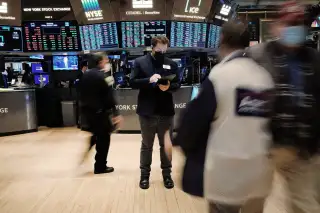Why the Stock Market Is Tanking, and What Investors Should Do Now

This is a scary moment for stock market investors.
The S&P 500, a common benchmark used to measure how the stock market is doing overall, fell into correction territory Monday following its worst week since March 2020. (A market correction is a decline of between 10% and 20% from its most recent high.) The news comes after a rough start to the year for investors overall, with tech stocks and cryptocurrency suffering particularly bad price dips.
Swings in the stock market are hard to stomach, especially for investors who have gotten used to strong returns.
Here's what experts say is going on with stocks right now — and what you should do about it.
Why is the stock market down?
There are several factors impacting the stock market right now, including the Omicron variant of COVID-19 slowing economic growth and recent disappointing earnings results.
But the most important factor impacting stocks is the notion that the Federal Reserve is going to raise interest rates and remove liquidity from the market, says Jack Ablin, chief investment officer and founding partner at Cresset Capital. (Liquidity refers to how easily assets can be bought and sold.)
The market was also long overdue for a correction, says Jim Paulsen, chief investment strategist at The Leuthold Group. And now that prices have started to fall, investors are fearful.
"The reason it's trading like it's trading at the moment is just purely emotions," Paulsen adds. "You're not going to be too worried about fundamental reports — like economic reports or earnings reports even — until this market just technically finds some stability for a few days."
Investors are trying to "get out of the way" right now as markets fall, Paulsen says, driving the sell-off to continue. We've seen this before: In March of 2020, investors yanked $326 billion out of mutual funds and exchange-traded funds, which was more than triple the fund outflows seen in October 2008, the previous record, according to Morningstar.
"How low can this go? No one knows and until it shows some bounce and some stability for a period, I think emotions are going to be the primary thing that's pushing the market," Paulsen says.
What should investors do now?
So, should you panic? No, Paulsen says, adding that underlying fundamentals of the economy remain pretty solid.
"Stay focused on where you might be a year from now rather than where you might be a month from now," he adds.
But there may be ways to better position your portfolio right now. The willingness of the Fed to keep interest rates low for so long has led to a risk-taking environment where the most volatile assets often did the best, Ablin says. Yet as the liquidity profile starts to tighten and getting access to capital becomes incrementally more difficult for investors, it's going to be the most speculative assets in the market that will feel the impact most.
So if you're invested in highly speculative assets, it might be time to consider taking some of that risk off the table, Ablin says. Cryptocurrency is one example of these highly speculative assets, and their prices are plummeting lately.
This could also be a buying opportunity. There are areas of the market that are pretty favorably valued and should do fine even if liquidity is removed from the market, Ablin says. Those include international stocks and small-cap growth stocks, which really didn't benefit from a lot of the central bank's liquidity and didn't rally with big tech stocks.
"Not only do they have more of a downside cushion but they may actually rise," Ablin says.
Frank Panayotou, managing director, UBS Private Wealth Management, said via email his firm is positioning client portfolios to favor the winners from global growth, including energy and financials, and that the global healthcare sector provides an appealing mix of defensive and growth characteristics. (Defensive stocks tend to be more stable even when the overall stock market is volatile, and growth stocks are those expected to grow at a higher rate than the overall market.)
Overall, the key to weathering market storms like we're seeing right now is to maintain a diversified portfolio — with a mix of large, small, domestic and international stocks as well as bonds, if that makes sense for you — and rebalance it regularly. (Rebalancing is when investors sell investments that have increased in value and replenish investments that have decreased in value to get their portfolio back to holding its target weights.)
You might also consider a safe hedge against inflation, by parking some of your money in Series I Savings Bonds ("I bonds" for short) or high-yield savings accounts, if you're worried.
More from Money:
Why Tech Stocks, Meme Stocks and Cryptocurrencies Are All off to a Rough Start This Year
What Crypto Investors Need to Know as Bitcoin's Price Plummets